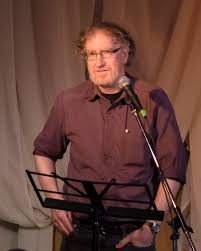Don McKay (photo by Shelley Banks; the original copyright photo appeared on http://latitudedrifts.blogspot.ca/2013/05/sage-hill-poetry-colloquium-spring.html)
We are delighted to publish the following article. John Nyman is a graduate student and Toronto-based poet. He is currently beginning PhD studies in Theory and Criticism at Western University.
Frye’s Social Function of Literature and the Ecopoetry of Don McKay
John Nyman
When Northrop Frye claims, in The Educated Imagination, that “literature belongs to the world man constructs, not to the world he sees; to his home, not his environment” (12), his vision seems radically disconnected from that of the nature poet or ecopoet, who seeks to represent or even protect nature by portraying it in literary language. For example, “com[ing] to grips with the practice of nature poetry in a time of environmental crisis” is the central concern of Vis à Vis (9), the first of three books of philosophical and field notes by Don McKay, one of Canada’s foremost ecopoets. In accordance with this aim, McKay begins his book with an ethical stance against the “one pole of our relations to material existence” he calls “matériel,” a “second-order appropriation” which “address[es] things in the mode of utility” (Vis 20)—an address which feels very much like an important part of Frye’s literature as the language of “what [we] want to construct” (Educated 7). Considering these key images in both thinkers’ works, Frye’s vision of the social function of literature and McKay’s deployment of poetry appear to come up against each other in deadlock. However, a deeper reading of these thinkers shows that Frye’s and McKay’s bodies of thought coalesce on an understanding of nature and society as ethically inseparable, which gives shape to their shared vision of poetry. While each thinker approaches this model from a different direction—Frye from a central interest in humanism and McKay from the political standpoint of ecology—reading their understandings with rather than against each other helps us produce a fuller and more fruitful picture of the relationship between humanity and our natural environment.
In Frye’s most direct discussions of the social function of literature, all of the elements he incorporates into his model are linked to the human and defined by their relationship to the human, initially making his perspective very different from McKay’s. In Words with Power, Frye argues that literature is significant because it engages with the language of myth—the “sacred ground” of human society which defines what a human subject “must know” (as an assumption, not a prescription) in the first place (41)—to focus attention on what he calls “primary concerns”: food, sex, property—“in the sense of what is ‘proper’ to one’s life”—and “liberty of movement” (51). In this way, literature moderates society’s normally overwhelming focus on less important “secondary concerns,” which “include patriotic and other attachments of loyalty, religious beliefs, and class-conditioned attitudes and behavior” (Frye, Words 50). But primary and secondary concerns are still both human concerns, and both the language of mythology and the dialectic or logos Frye opposes it to are human forms; nowhere is the nonhuman implicated in the work of the poet. In contrast, McKay’s explorations of poetic practice highlight a concern with “wilderness,” which is essentially nonhuman and unknown, before even the understanding of “place.” At the outset of Deactivated West 100, McKay explains the contours of his central aim, which involves thinking a perspective outside of Frye’s “sacred ground” of human society:
Suppose we try to define place without using the usual humanistic terms – not home and native land, not little house on the prairie, not even the founding principle of our sense of beauty – but as a function of wilderness. Try this: ‘place is wilderness to which history has happened.’ Or: ‘place is land to which we have occurred.’ Our occurrence to the land – the act which makes place place – could be a major change (homestead, development, resource extraction) or a smaller claim (prospector’s stake, survey marker, plastic tape, souvenir stone), but it shifts the relationship; it brings the wild area into the purview of knowledge and makes it – perhaps momentarily, perhaps permanently – a category of mind. (17-18)
This explanation is corroborated by further elaboration of McKay’s concept of wilderness, which he describes in Vis à Vis as “the capacity of all things to elude the mind’s appropriations” (21). “Wilderness” is an element of what we commonly call nature which is before or beyond humans’ “primordial grasp,” the gesture which leads us to create our non-natural identity by marking nature as ‘other’ and “establish[ing] the place where representation and recollection occur” (McKay, Vis 22). Wilderness also, then, stands against the extreme form of human “grasping” which is the ruthless appropriation or utilization of the natural world amounting to “the colonization of its death” or “a denial of death altogether” (McKay, Vis 20). This process, for McKay, is the making of “matériel,” or “matérielization” (McKay, Vis 20).
